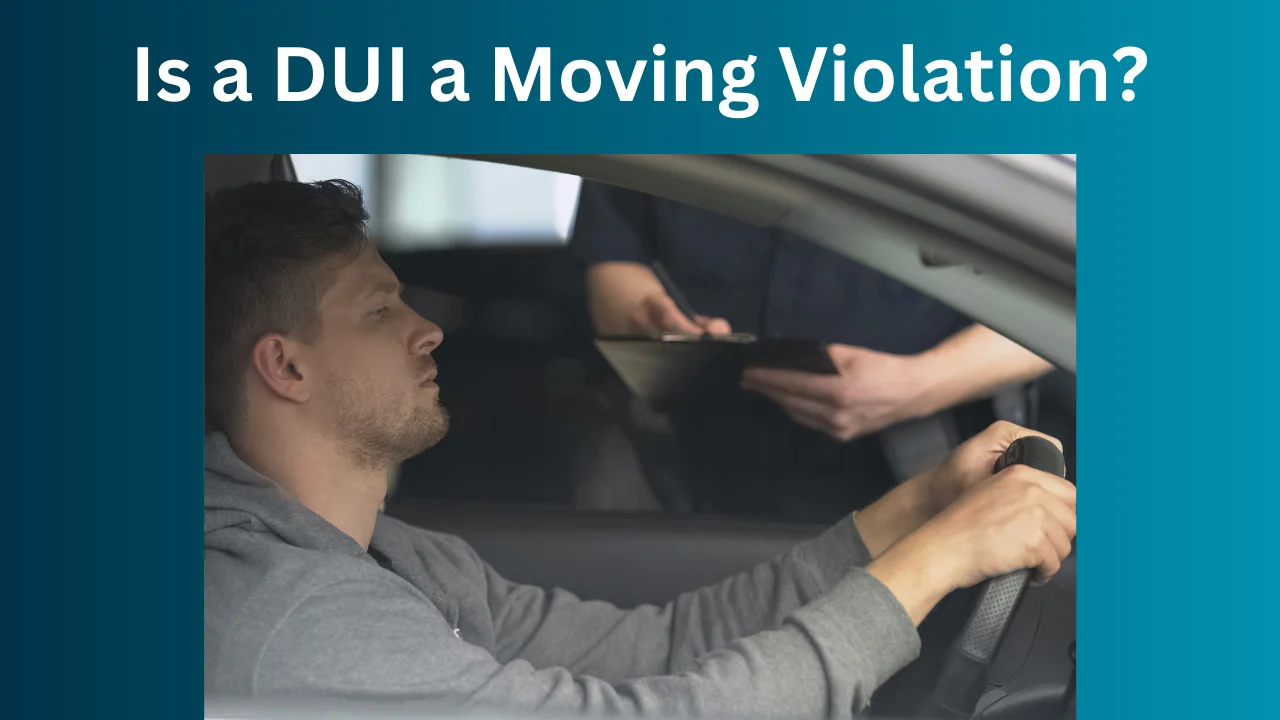Introduction
There are serious legal and safety ramifications to being caught driving while under the influence (DUI). In order to comprehend the effects of drunk driving on drivers, the justice system, and public safety, it is essential to classify it as a moving violation. Is a DUI a moving violation? This article explores the intricacies of traffic laws, the consequences for individuals found guilty of driving under the influence, and whether or not it is considered a moving violation.
Understanding DUI and Moving Violations
What Constitutes a DUI?
Operating a vehicle while under the influence of drugs or alcohol is known as Driving Under the Influence, or DUI. Because of this disability, the driver may be unable to drive safely, endangering not only themselves but also other motorists.
Moving Violations Explained
When a vehicle is in motion when a violation of traffic laws occurs, it is called a moving violation. Drunk driving, speeding, and failing to stop at a red light are all examples of such infractions. Moving violations are more serious than non-moving ones because they directly affect road safety, unlike the former, which usually involve parked vehicles.
DUI Offense Severity
Because they entail driving in an unsafe environment, DUIs are considered moving violations. Because drunk drivers are less able to control their vehicles and make sound decisions, they increase the risk of collisions, injuries, and even death.
Legal Impact of DUI Moving Violations
Consequences on Driving Record
A person’s driving record is severely affected by a DUI conviction. Insurance premium increases and license suspension is a real possibility as a result of the accumulation of points. It is crucial to keep a clean driving record because penalties get much worse for repeat offenders.
Financial Consequences
High penalties and legal costs are associated with driving under the influence. In addition, drivers frequently encounter higher insurance premiums, which can put a strain on their budgets. The significant impact on long-term finances underscores the gravity of driving under the influence (DUI) charges, which are considered moving violations.
Mandatory Alcohol Education Programs
Offender participation in alcohol education programs is mandated by numerous jurisdictions. In order to emphasize the gravity of driving under the influence (DUI) offenses, these programs seek to inform drivers of the risks associated with DUI and encourage safer driving practices.
License Suspension and Revocation
First-Time Offenders
Depending on the gravity of the crime and the laws of the offender’s jurisdiction, first-time DUI offenders may be subject to license suspension. The severity of drunk driving is highlighted by this suspension, which acts as a deterrent.
Repeat Offenders
Drivers whose licenses are permanently revoked or whose suspension periods are lengthened for subsequent DUI convictions face harsher penalties. Reducing repeat offenses and improving public safety are the goals of this increase in penalties.
Insurance Impact of DUI Moving Violations
Higher Premiums
Insurance premiums are impacted negatively by a conviction for driving under the influence. Insurance companies consider drivers with a history of DUI convictions to be more of a risk, which means that their premiums will be higher.
Difficulty Obtaining Insurance
Following a conviction for driving under the influence, some drivers may have trouble securing insurance. A DUI conviction is magnified by the fact that high-risk insurance pools typically have more stringent criteria and greater premiums.
Public Safety and DUI Offenses
Road Safety Concerns
There is a serious threat to public safety from drunk driving. Due to the impaired judgment and diminished motor skills of the driver, serious accidents involving a drunk driver can be extremely dangerous, even fatal.
Deterrence and Legal Repercussions
Driving under the influence is discouraged because it is considered a moving violation. Reducing drunk driving, making roads safer, and protecting the public welfare are all goals of harsh penalties and legal repercussions.
DUI Legal System Approach
Jurisdictional Penalties
Punishments for driving under the influence offenses differ from one jurisdiction to another. Local legal systems handle drunk driving offenses differently, which is why some areas have harsher penalties to discourage impaired driving.
Criminal Offense and Moving Violation
In many places, driving under the influence is considered both a moving violation and a criminal offense. The gravity of the crime and its effect on public safety are highlighted by its dual categorization.
Long-Term Effects of DUI Moving Violations
Employment and Background Checks
Jobs may be harder to come by after a DUI conviction. A conviction for driving under the influence (DUI) can be a disaster for one’s career and one’s reputation in the eyes of many employers who run background checks.
Future Driving Privileges
Restrictions on future driving privileges may be imposed on drivers with convictions for driving under the influence. The goal of these regulations is to limit road use to those who are capable of operating motor vehicles safely and responsibly.
Frequently Asked Questions
Is a DUI considered a moving violation in all states?
While most states classify a DUI as a moving violation, specific definitions and penalties may vary. It’s essential to check local laws to understand how a DUI is treated in your jurisdiction.
What are the penalties for a DUI moving violation?
Penalties for a DUI moving violation typically include fines, license suspension, mandatory education programs, and potentially jail time. The severity of the penalties depends on the offense’s specifics and jurisdictional laws.
How does a DUI moving violation affect insurance rates?
A DUI moving violation leads to higher insurance premiums. Insurance companies consider DUI offenders high-risk drivers, resulting in increased costs for coverage.
Can a DUI moving violation be expunged from a driving record?
In some jurisdictions, DUI convictions can be expunged after a certain period, provided the offender meets specific requirements. However, this process varies, and not all DUI convictions are eligible for expungement.
What steps can be taken after receiving a DUI moving violation?
After receiving a DUI moving violation, it’s crucial to comply with legal requirements, such as paying fines and attending mandatory programs. Consulting with a legal professional can help navigate the legal process and explore options for mitigating penalties.
Conclusion
Classifying a driving under the influence as a moving violation highlights the gravity of the crime and its effect on society’s security. Is a DUI a moving violation? In order to encourage responsible driving habits and make roads safer for everyone, it is critical to understand the legal ramifications, financial ramifications, and long-term impacts of a DUI conviction. A safer and more responsible driving culture can be fostered when drivers obey traffic laws and do not drive while impaired.

Shannon Reyes is a seasoned writer with a knack for crafting engaging blogs on a variety of service industries, including plumbing, cleansing, moving, pest control, and roofing. With a keen eye for detail and a passion for helping readers navigate complex topics, Shannon brings her expertise to life through informative and accessible content.











